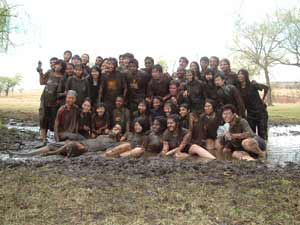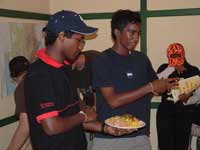| Into wild,
wild Africa
N. Dilshath Banu
The drum beat… noises of folk
songs and dances… all amidst the thick green jungles
packed with wildlife, yet to be discovered. This is
what comes to our mind when we talk of Africa. Jehan
Nalin Goonaratne of S. Thomas’ College and Vinod
Malwatte of Royal College had the chance to be in the
‘International Wilderness Expedition 2006,’
which took them on an adventure to South Africa in August.
 |
| Mud mates! |
This programme, organised by Cathay
Pacific, was open to students interested in wildlife,
while ‘Ubangani Wilderness,’ a wildlife
team from South Africa, sorted out the logistics. Both,
Jehan and Vinod are involved in various extra-curricular
activities in school, and after much sorting out from
applicants of different schools, they were chosen to
experience the African adventure.
With much expectations, the duo left
the country on August 22 and were in transit in Hong
Kong, where they met all the delegates, eight from Hong
Kong, three from Vietnam, China, Japan and Taiwan, two
from Pakistan, Bahrain, Thailand and Malaysia; and they
were yet to meet their 10 South African pals. Soon they
embarked on a thirteen-hour journey and landed in Johannesburg
in the morning. The adventure had begun…
“We were in Hotel Inbada, where
we met our South African delegates. All of us were divided
into four groups, and the first activity was to find
what was common amongst the group members. In my group
the common thing was that all the members identified
with the ‘Mexican’ flavour. In Jehan’s
group, they found that they could twist their tongues
in weird ways,” says Vinod.
After a few more orientations, they
boarded the bus again for another three-hour ride to
‘Botshabelo’ – where the adventure
team was based.
The second day was an outing and the
team drove and walked by fountains, over plains and
along river sides. In the event that there were questions,
maybe to do with the identification of plant or animal,
each group had a tour guide to help them. This day was
special for Jehan and Vinod, as both of them cooked
a Sri Lankan meal for lunch.
“Everyday one country had to
cook their traditional food for the whole team –
that is nearly for 50 people. We decided to cook yellow
rice, chicken and cadju curry. Cooking was not new for
us!” says Jehan, however, who admits that this
is the first time he’s cooked a cadju curry and
it tasted good.
“We took spices with us thinking
that there won’t be any, but in fact they provided
us with the spices needed,” says Vinod, adding
that the Sri Lankan meal was awarded the ‘Best
Meal.’
When it came to introducing the country
and its culture, the boys say, “While explaining
about Sri Lanka, there were questions about wildlife,
especially the human-elephant conflict, the tsunami
and how we are rebuilding and there were questions about
our gem city – Ratnapura, but there were no questions
on the ethnic conflict,” notes Vinod.
 |
| That special Sri Lankan meal |
Later in the day, the group had a night
orientation and went out to talk to the ‘Ndebele
Tribe,’ one of the native tribes of South Africa.
“It was like a remnant of an abandoned stone castle
built in the midst of grassland. At the entrance there
were two huge stone towers about 20 feet tall, echoing
with the memories of the past. We visited their hamlets;
each one is different from one another – the village
chief had his hut with more covering and it differs
from the ordinary person’s hut, which is with
less covering. The people wore large rings around their
necks. We had dinner with the tribe and it tasted like
flour paste, with chicken and potatoes. After that,
we were taught to read the stars and to learn how the
stars could guide us when we lose track in the middle
of the jungle. It was very educative,” described
Jehan.
Another morning started with a surprise,
when a huge tapping noise woke up Vinod. “It started
around six, and I felt as if something was hopping on
the roof. But when I went out, I realised it was tiny
ice particles – a hailstorm,” says Vinod.
The team also visited the Bird Rehabilitation
Centre, where only Jehan was able to hold a falcon on
his arm. And they visited ‘Loskop Dam Nature Reserve,’
which is a national park, where Vinod was able to get
close to a huge Rhino while he was on a boat voyage.
They witnessed huge pythons and spitting snakes in the
Reptile Park. In the midst, the whole gang got the chance
to get muddy in a huge mud pool. Great Fun!
The team also had the opportunity
to do community service by painting a portion of the
school and planting vegetable beds in the surrounding
area.
This was not only an adventure tour,
but also a cultural exchange and to show an important
aspect of culture, the programme included a ‘mock
wedding,’ where Vinod was the bridegroom and Jehan,
the kapuwa. “We got a South African girl to get
into a Kandyan outfit. We had to explain how our wedding
ceremonies take place. Some wedding ceremonies had dances
after the formal vows,” says Vinod.
The final night out was something
personal. The whole lot went out, once again to the
place closer to the ‘Ndebele Tribe’ and
made a campfire. While the wood slowly burned, the songs
and dances of diverse cultures fused together to form
a different beat. Later, they slept out in the open
with each person allotted a period of an hour to wake
up, witness the fire and write their thoughts. Vinod
had to wake up at 2 a.m, and it was a time he was in
dire need of sleep, however the memories of the day’s
events kept him up and inspired. Jehan was lucky that
his time was between 5-6 in the morning, and was able
to view the beauty of sunrise, as he scribbled in his
‘Reflection Dairy.’ This was the last day
in ‘Botshabelo.’
“Definitely, this was a once-in-a-lifetime
opportunity for us. It taught us many things and we
are bringing back the experience and the lovely memories,
which we may be able to use someday in life,”
says Vinod, while Jehan adds, “We all have preconceived
notions about people and their cultures.”
“I imagined all South Africans
as fierce, but finally when I met them, I realised that
every one of us aren’t as different as we assume
we are,” says Jehan.
|
